Freshly Divorced Man Insists On Getting A New Dog Even Though His Ex-wife Is Against It
If you are married or in a civil partnership and planning a divorce or dissolution with your partner, one of you will usually want to leave the family home. This, however, is not always possible.
This could be for a variety of reasons, but it is frequently due to financial constraints, as it may be impossible to maintain two separate homes. Another common reason could be the desire to keep children in a stable family environment.
Under either of these circumstances, you may have no choice but to continue living together in the same house, which isn't ideal given that you're no longer compatible. You can expect your ex-wife-to-be to disagree with you on almost everything, which can be frustrating.
Scapps88, a Redditor who has just divorced his wife, found himself in this situation. This Redditor needs a dog to support him emotionally, as his previous dog has passed away, but his ex-wife does not want him to get one.
It was obviously a distressing situation, as the OP was in dire need of mental support during the difficult divorce period, and he believed getting a dog would go a long way in comforting him. Read on to know how the entire story unfolded, prompting the original poster to share the story with the AITA community in order to get their opinions.
We have compiled snapshots from the post and the comments for you.
This Redditor chose to get a dog despite his ex-wife being against it

The OP and his wife are now divorced

I have wanted a new dog for a while now
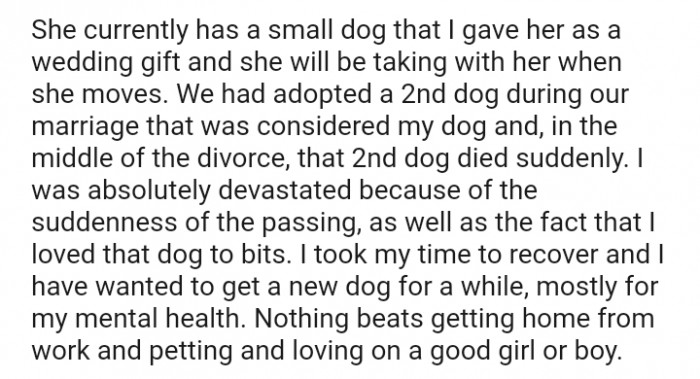
The Psychological Impact of Divorce on Pet Ownership
Dr. Sarah Thompson, a psychologist focusing on post-divorce adjustments, explains that pet ownership can serve as a coping mechanism for individuals navigating the emotional aftermath of separation.
Research shows that pets can provide significant emotional support, helping to alleviate feelings of loneliness and sadness that often accompany divorce.
However, this desire for companionship can sometimes clash with the responsibilities that come with caring for a pet, especially when former partners have different views.
Navigating Post-Divorce Adjustments
Post-divorce behaviors can often reflect deeper emotional needs and unresolved feelings. Research from the National Institutes of Health indicates that major life transitions, like divorce, can trigger a desire for new companionship, manifesting in pet ownership. For some, acquiring a new pet may symbolize a fresh start or an attempt to reclaim a sense of normalcy.
Yet, these decisions can also stir up significant emotional responses in former partners, highlighting the complexities of shared responsibilities and feelings of resentment that may linger post-separation.
I am not asking for anything above and beyond
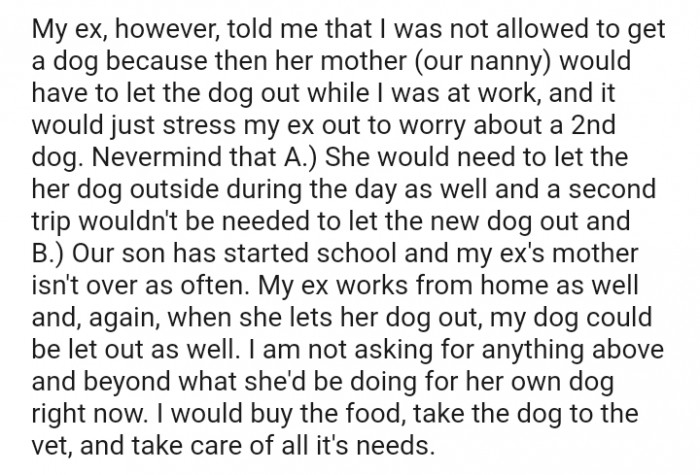
I pay for the mortgage of the house exclusively

I'm meeting a dog that I might potentially adopt

A behavioral psychologist points out that the insistence on getting a new dog despite the ex-wife's opposition may indicate unresolved grief or a need for control.
Studies suggest that after a significant loss, individuals may seek to fill the emotional void with new relationships or responsibilities, including pets.
This behavior can be seen as a way to regain a sense of normalcy or purpose following a tumultuous period.
Psychologically, the urge to adopt a new dog can stem from a need for emotional support during a time of upheaval. Research shows that pets can provide comfort and stability, especially for individuals feeling isolated or abandoned. However, it’s essential to weigh the emotional readiness for pet ownership against the potential stress it may cause in co-parenting relationships.
And the comments pour in, with most replies from Redditors condemning the OP's actions, while a few supported his choices.
Who's going to let your dog out later on?

Who will take care of your dog while you work?

You can wait until she moves out

Navigating Co-Parenting and Shared Responsibilities
Experts recommend establishing clear communication and boundaries when it comes to co-parenting pets after a divorce.
Creating a shared pet-care agreement can help both parties understand their responsibilities and expectations, reducing conflict.
Seeking mediation or therapy can also facilitate discussions about pet ownership, ensuring that both voices are heard and respected.
Understanding Resistance from Ex-Partners
Ex-partners may exhibit resistance towards new pets due to concerns about shared responsibilities or emotional attachments that may complicate their post-divorce interactions. According to Dr. John Gottman, a renowned marriage researcher, "Discussions about shared pets can often reveal deeper issues of trust and cooperation that need to be addressed." Such resistance can indicate a need for clear boundaries and respect for each other’s emotional space, which is essential for healthy co-parenting dynamics, as emphasized by Dr. Tina Payne Bryson, a child development expert who states, "Establishing emotional boundaries is crucial for maintaining a positive co-parenting relationship."
She will not be responsible for the dog at all

There's a lot for the new puppy to get used to
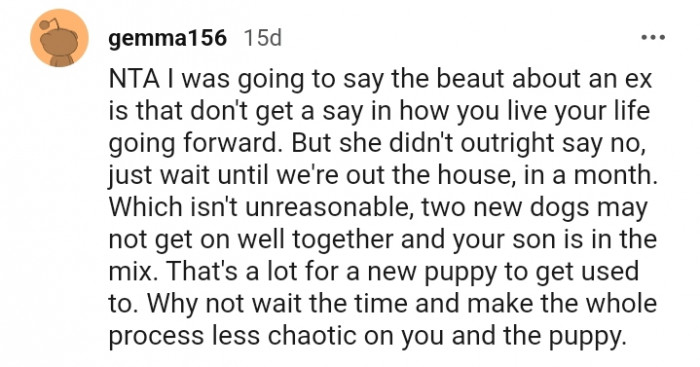
Wait for her to move out first

Social psychologists emphasize the role of social support networks during transitions like divorce.
Research indicates that having a strong network can significantly impact emotional well-being and decision-making processes.
It may be beneficial for the man to seek support from friends or professionals who can provide insight and perspective on his desire for a new dog.
Additionally, the motivations behind wanting a new dog can vary significantly between partners. While one may view it as a means of emotional healing, the other might see it as a source of further complication. Understanding these differing perspectives is crucial for effective communication and conflict resolution.
Get the dog after she moves out
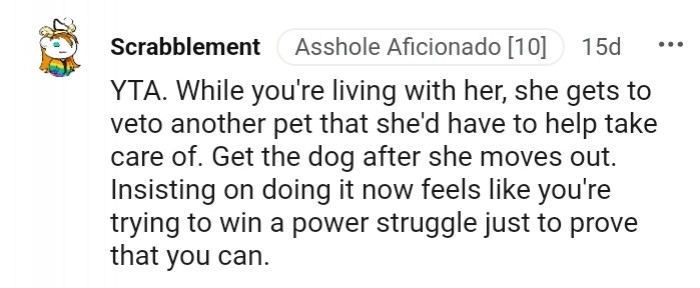
You can pick the dog next weekend

Wait until the end of the month

Practical Solutions for Co-Parenting and Pet Ownership
To navigate these challenges, open communication is essential. Setting a joint meeting to discuss pet ownership can help clarify boundaries and responsibilities, ensuring both parties feel heard. Establishing a shared pet care plan can also alleviate concerns, providing a structured approach to managing responsibilities while respecting emotional boundaries.
Engaging a mediator or counselor specializing in post-divorce issues may also provide valuable insights and facilitate smoother conversations.
This Redditor tells the OP to go get his happiness

It's your house, so you can do what you want
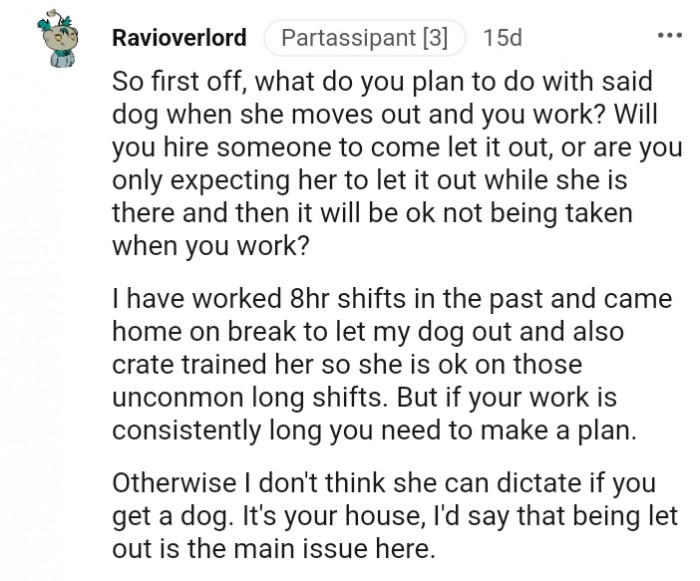
She will refuse to take care of the dog
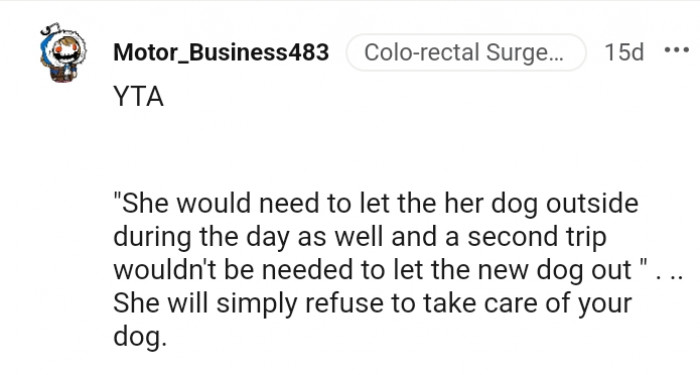
Moreover, understanding the emotional implications of introducing a new pet can help both parties assess their readiness for this commitment. Studies suggest that discussing potential impacts on children and shared living arrangements can guide decision-making, ensuring that both partners feel comfortable with the choice.
You are asking her to be responsible for your dog
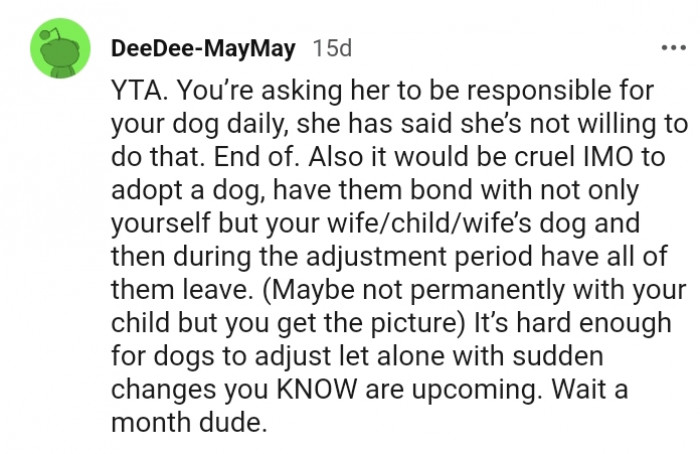
There are more solutions to this
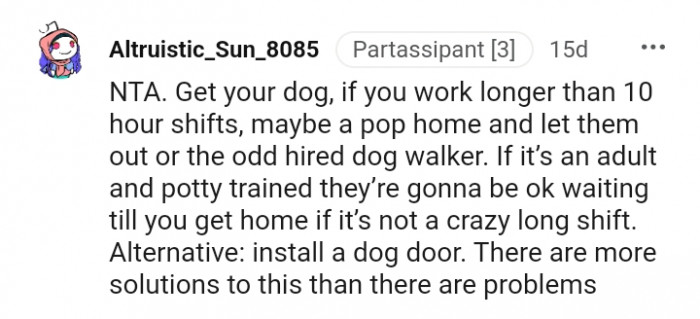
The reasonable thing to do will be to...

The Benefits of Emotional Support Animals
Research supports the benefits of emotional support animals in promoting mental well-being post-divorce. Pets can provide companionship, reduce feelings of loneliness, and even help alleviate symptoms of anxiety. However, it's crucial to ensure that the decision to adopt a pet is made with consideration of all family members' needs.
Creating a family discussion about pet ownership can empower everyone involved, facilitating understanding and cooperation among all parties.
You need to think this through

It's his home, so he can do whatever he wants

Couples that are happily married can easily put their heads together to reach a decision or even mutually compromise for each other, as they have the interests of both at heart. However, it is an entirely different situation for couples that are going through the divorce process.
What are your thoughts on this story? Let us know in the comments section below.
Ultimately, adopting a new dog post-divorce should be approached thoughtfully. By considering the emotional implications and ensuring open communication, individuals can make decisions that respect their own needs while fostering cooperation with their ex-partner.
Psychological Analysis
This situation highlights the emotional complexities that arise during and after a divorce. The desire to adopt a new pet often stems from a need for companionship and emotional support, but it can also bring up unresolved feelings and conflicts with an ex-partner. Open communication and mutual understanding are key to navigating these challenges effectively.
Analysis generated by AI
Analysis & Alternative Approaches
In essence, the decision to adopt a new pet after a divorce is laden with emotional complexities that require careful consideration. Engaging in open dialogue and understanding the emotional needs of all parties involved can create a path towards a healthy co-parenting dynamic while addressing personal emotional needs.
Analysis & Alternative Approaches
Divorce can profoundly affect an individual's emotional landscape, influencing their decisions, including pet ownership.
According to Dr. Gary Chapman, marriage counselor, "Understanding the emotional needs that arise from divorce is crucial for making healthy choices, including whether to bring a pet into your life." He emphasizes that addressing these feelings can lead to better relationships with both ex-partners and pets. By fostering open communication about emotions, individuals can create more fulfilling outcomes in their post-divorce lives.



